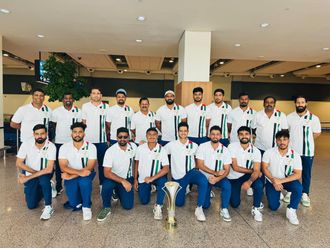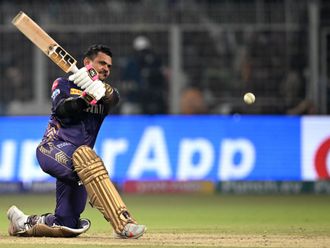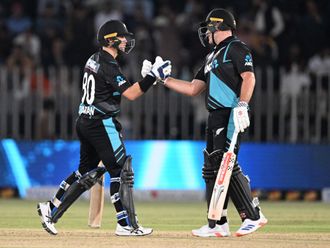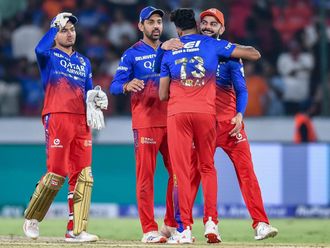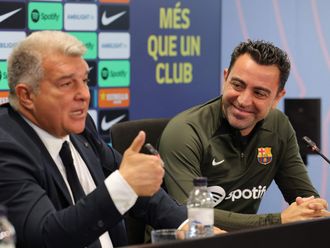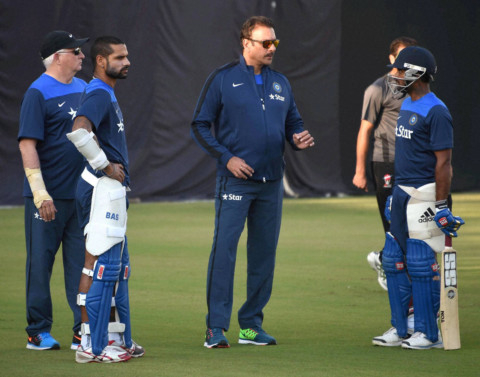
Dubai Ravi Shastri is not rash. He has seldom lived on the edge. The absence of this trait, however, does not mean that he will shy away from a chance to make you put your money where his mouth is. He has done that repeatedly and effectively — through the many evolutions that he has undergone in his career — on and off the field of cricket.
Shastri has seldom backed down from stressing his credentials, when pushed against a wall, ever since he was selected to play for India in 1981. Time and again, he has proved the point that when it came down to the value of an individual in a team — he was worth his weight in gold.
Shastri offered a certain brand promise when he wore the Indian colours and walked out to play for his country. His skills and contribution to the game can never be flippantly assessed given that the valuation is ratified by the illustrious company that he kept — with the likes of Sunil Gavaskar, Kapil Dev, Dilip Vengsarkar, Mohinder Amarnath to name a few — in the Indian dressing room.
He has been acutely switched on to ensure that his career graph has never produced a straight line. When he made an honest evaluation of his skills as a cricketer, following a recurring knee injury, he proudly called it a day and went on to become a household name in the field of cricket commentary. Shastri became a trendsetter who ensured that the profile of commentators were as outsize as the cricketers themselves. In that sense, he was one of the pioneers of his genre.
Astute, perceptive, a remarkable student of the game and the policies that have shaped it over the past two decades, Shastri has leveraged his personal and professional attributes towards the progress of cricket, whether it be as a player, commentator, official, or an administrator.
He possesses two important attributes: knowledge, to always be one step ahead, or at par, of his critics and a thick skin, to ignore their opinion of him. Therein lies his success. He has never considered himself to be anything less than the sure thing.
The best of Ravi Shastri, however, has always been reserved for the Australian continent. The all-rounder who did not figure in the playing eleven for India during their triumphant sojourn at the World Cup in 1983, underlined his credentials in instant cricket when he was judged the Champion of Champions in the World Championship of Cricket in 1985. There were stirring performances in tours Down Under that followed later. Epic battles between bat and ball. They proved to be catalysts that forged the steel in Shastri’s temperament.
Post retirement from the game in 1994, Shastri has returned to his favourite battleground, as a commentator. His stature in the world of commentary and analysis was growing. He had tackled the established trait of deadpan assessment and replaced it with a passion and magnetism that found favour and flavour with an audience who stayed away from the stadium, but remained switched on, in front of the television.
Today, Shastri returns to Australia as a Director of Cricket, appointed by the Board of Control for Cricket in India (BCI), to look into the well-being, affairs and progress of the Indian team. He exudes the same emotion of blood lust in this new assignment as though he were walking in to take his guard in front of the stumps.
“The moment I set foot here I was pumped, even though I do not have a bat in my hand,” he told Gulf News emphatically in an interview.
A tour of Australia is never an easy assignment. The examination of a sportsman’s skills and temperament are nothing short of stern. The prevailing atmosphere on the pitch can be compared to a war-zone where the trails are laden with explosives. The opposition is fierce, the competition hard, pressure builds up to a boiling point, and the fear of failure can override the willingness to succeed for even the toughest professional.
The Aussies prescribe to the theory of ‘tough love’. Slice the enemy up. Spill their guts on the field and invite them for a drink later. Few have accepted this invitation.
Shastri, however, is comfortable in this environment. It is akin to being a home away from home. He thrives on it, because it brings out the best in him.
It would appear that he has been settling down in his new role as mentor and adviser to the younger cricketers ever since his appointment was made during a modest, but controversial, tour of England this summer.
“It has been a very enjoyable experience,’’ he admitted with the Yoda-esque air of a professor who is talking about his favourite subject. ‘’More than anything else, I always knew that I had a good bunch of boys. It was just a case of making them believe in their abilities and encouraging them to play a brand of cricket that was aggressive, but enjoyable to watch.
“Luckily, a lot in this team don’t carry mental scars of past failures. It will be a case of believing in your ability and being competitive. The boys will learn a lot from this trip. There is a new level of aggression and if you back your ability that’s when you become competitive and the one thing clear is that there are no short cuts here. You have got to guts it out and if you are prepared to do that people will know from the outset that you are competitive.’’
Though he will not be present on the pitch with a batting partner, the gravity of Shastri’s task cannot be emphasised enough. “The boys have been with me for a couple of months now. They know how I think and Australia is going to be no different. Basically, the concept is all about playing hard cricket as a well drilled aggressive unit. I have had individual chats with every player in the squad and schooled their responsibilities into them.
“It is a case of being positive,’’ stated Shastri, echoing his own emotions. ‘’I want them to enjoy themselves, because if you don’t do that then you start feeling the heat. It is a case of believing in your ability and knowing that if you are not good enough then you shouldn’t be here.’’
With the Indian team fulfilling one half of their supporters’ expectations by being a leading one day side in the world, at the cost of establishing a good Test win-loss record, Shastri is willing to allow them to appreciate their potential in the longer version of the game over a period of time.
“Test cricket is a new experience for the boys. This whole fuss about the Indian team not being good in Tests is a creation of the media. Barring one team in the world today, which is South Africa, pinpoint one squad in the world that travels well? I can’t see a single team that has not struggled overseas. We saw Australia travel to Dubai to play Pakistan. What happened there? But catch them playing in the same manner in Australia.
“My expectation from the current Indian team is that they are young and talented and therefore, I would like to see them playing to their potential and above it. If we do that, then we will take whatever result comes our way.
“The only pressure should come from competing,’’ Shastri reiterated when asked if the Indian team was ready to face up to scrutiny by the Australian media. “No one is bothered by the media. It’s all about how you want to see it. The boys don’t need protection. They are old enough to know how to play and if they cannot do that, then they will need to put their hands up. There are no excuses to be made and no favours will be granted. At the moment even I have accepted this challenge, so my focus is entirely on that. Commentary can wait.
Shastri is ready to subscribe to the view that this could be one of the more balanced one-day teams to visit Australia, ahead of the World Cup early next year where India step in as defending champions.
A sense of cautious optimism is exhibited by Shastri when he is asked to evaluate India’s World Cup prospects. “It is important to have a good start,’’ he stressed. ‘’There are a number of players who were not part of the last World Cup, so in many ways there will not be too much pressure. We are defending champions, but on paper only.’’
Irrespective of whether India win or lose cricket’s most coveted title, Shastri believes that Indian cricket is in the preparatory phase of a new dawn.
“I see positive signs two years down the line,’’ he indicated. ‘’We cannot judge by immediate results. They will act as markers for the future. This team started well in England, but eventually caved in. It is a learning process. This tour is the big one. The scheme is to develop a good one-day team and a consistent Test playing side one tour at a time. If you look at the current age group of these players (25-27 years) it is a good time for them to be touring. If they are willing to guts it out then they can learn.’’
Every cricketer, by that definition, is a student of the game. Shastri, however, muzzles his emotions when asked to pinpoint any individual for special mention. ‘’When I do this job, I don’t single out anyone,’’ he offered. ‘’The team is more important than any individual.’’


